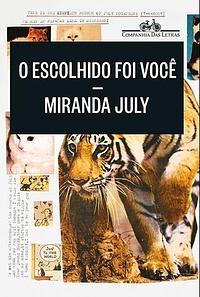Take a photo of a barcode or cover
I love everything july does. except for the future. that I hated. this book is about that, in a way, but the parts that aren't are lovely and instructive.
"In my paranoid world every storekeeper thinks I'm stealing, every man thinks I'm a prostitute or a lesbian, every woman thinks I'm a lesbian or arrogant, and every child and animal sees the real me and it is evil."
"The moral of these people was clear to me: if you spend your life endlessly cruising around the world, never stopping to plant children on dry land, then when you die some Greek woman you don't even know will become the steward of your legacy. And when she wants more room in her house, she sells your legacy in the PennySaver. And no one wants it."
"The moral of these people was clear to me: if you spend your life endlessly cruising around the world, never stopping to plant children on dry land, then when you die some Greek woman you don't even know will become the steward of your legacy. And when she wants more room in her house, she sells your legacy in the PennySaver. And no one wants it."
With lines like "All I ever really want to know is how other people are making it through life-- where do they put their body, hour by hour, and how do they cope inside of it" Miranda July is quickly shaping up to be one of my favorite humans. At some points while reading on the train I was physically tensed up and almost out of breath because of how deeply understood I felt. To be both a person who lives in your head and aware of that daily struggle and to be able to talk about it so beautifully is something that is winning my heart. You've cracked it wide open, July.
A delightful story of procrastination that becomes productive. Reminded me of Humans of New York where profound insights come from unlikely sources.
A very quick read, but uninteresting. A woman interviews a hand full of people who have advertised in the PennySaver newspaper in an effort to find her way through a writer's block. Didn't like it at all.
Recently married Miranda July gets stuck while working on the screenplay of her second feature film, The Future. While deliberately not working on her computer, with its endless distractions, she flicks through a free magazine distributed to LA residents called the PennySaver, in which people advertise items for sale (note: it is in the PennySaver that Juno finds the adoptive parents for her baby in the movie Juno). In a somewhat epic act of procrastination, Miranda decides to investigate the kind of person who advertises in the PennySaver, ringing people at random and offering them $50 to let her interview them, tell their story and photograph their house. It Chooses You is the result of that investigation.
In general, I enjoyed the book. July's style is very New Girl quirky, which I don't mind in small doses. I was, however, a little bit uncomfortable about how she represented some of the people she interviewed. Some of them she found creepy, others she found sad and lonely, a few disgusted her and she pitied all of them for their poverty. I hope she ended up giving them more than $50 and that none of them actually read this book. It is a very unsympathetic portrait of people I felt in general deserved better from the rich, white woman who takes their lives and turns them into stories for very little recompense.
Reading this book and July's reaction to people outside her social and work circle felt a bit like what I imagine it's like reading an alien's view of another species. She seemed to have no conception that people lived like in this way and at times seemed to even struggle communicating with the people she was interviewing. She was unable to relate to them in any way outside the film industry, and it's telling that the ones she liked, she wanted to bring into her movies, because that was the only way she could interact with them. The whole time I was reading It Chooses You I kept thinking *surely* no-one could be this clueless? Surely no-one could be this protected and privileged and chronically unaware of how protected and privileged she is? I mean, the people she interviewed were so very poor they were selling items for $1 pro $2 while July moved in with her husband but kept her own apartment as a private space without even seeming to notice that the cost of maintaining two households would be prohibitive for definitely everyone she interviewed but also most people in America. But then I read in her bio she was raised in Portland, Oakland and Berkeley to writer parents and has married a film director so maybe she really is. Maybe, however, it's a persona she's developed. I don't know. Either way, I would only recommend this book if you have a high tolerance for quirk and twee and patiences for the cluelessness of a rich person with no self-awareness.
In general, I enjoyed the book. July's style is very New Girl quirky, which I don't mind in small doses. I was, however, a little bit uncomfortable about how she represented some of the people she interviewed. Some of them she found creepy, others she found sad and lonely, a few disgusted her and she pitied all of them for their poverty. I hope she ended up giving them more than $50 and that none of them actually read this book. It is a very unsympathetic portrait of people I felt in general deserved better from the rich, white woman who takes their lives and turns them into stories for very little recompense.
Reading this book and July's reaction to people outside her social and work circle felt a bit like what I imagine it's like reading an alien's view of another species. She seemed to have no conception that people lived like in this way and at times seemed to even struggle communicating with the people she was interviewing. She was unable to relate to them in any way outside the film industry, and it's telling that the ones she liked, she wanted to bring into her movies, because that was the only way she could interact with them. The whole time I was reading It Chooses You I kept thinking *surely* no-one could be this clueless? Surely no-one could be this protected and privileged and chronically unaware of how protected and privileged she is? I mean, the people she interviewed were so very poor they were selling items for $1 pro $2 while July moved in with her husband but kept her own apartment as a private space without even seeming to notice that the cost of maintaining two households would be prohibitive for definitely everyone she interviewed but also most people in America. But then I read in her bio she was raised in Portland, Oakland and Berkeley to writer parents and has married a film director so maybe she really is. Maybe, however, it's a persona she's developed. I don't know. Either way, I would only recommend this book if you have a high tolerance for quirk and twee and patiences for the cluelessness of a rich person with no self-awareness.





